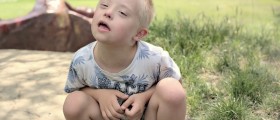
Down syndrome is a chromosomal disorder which features with an extra chromosome 21. Normally people have 46 chromosomes including two sex chromosomes (XX for women and XY for men). In this syndrome there is one extra chromosome and total number of chromosomes is 47. The additional 21 chromosome is the cause of the symptoms and signs of the disorder.
Down syndrome includes specific both body and mental abnormalities. These can vary from mild to rather moderate. The condition is incurable as the defect lies in genes. But with appropriate care, support from a family and the people from a child's surrounding (such as teachers) majority of children with Down's syndrome may grow up and live healthy and happily.
Children who have Down's syndrome have distinctive facial features. These include flat face, tiny and slanting ears. The ears are placed lower than in normal people. The mouth is tiny and the tongue can stick out. The chin is abnormally small, the state known as microgenia. Teeth are asymmetrical and sometimes crooked. Brush field’s spot is increasing of the iris (colored part of the eyes). The eyes are oblique and have epicanthic skin folds. These folds are present in the inner corners of the eyes.
Their neck is short and wide. The neck has excessive skin and fat. The length of extremities is not normal. Sometimes the space between the big toe and the second toe is wider than usual. What is specific is the line present on both of the palms which crosses the whole middle surface of the palms. This line is called a transverse palmer crease or simian line. Muscles are not so strong and the joints are slack. Weakness of abdominal muscles makes the belly protrude. The muscle tonicity develops over the years. The height is below average which is more noticeable in later years of their lives.
Beside the body abnormalities children with Down's syndrome may suffer from heart conditions and have problems with gastrointestinal tract or even lungs. Celiac disease, hypothyroidism, eye conditions as well as hearing problems commonly occur. In extreme cases children are more prone to leukemia and immune deficiencies.
These children are not intelligent. But even though the level of their intelligence is below average they can be taught lots of things. Intellectual and cognitive disability may vary a lot. Some of the children can reach the level of elderly children therefore are much capable of taking care of themselves but basically all of the children rely on parents.

















Your thoughts on this
Loading...